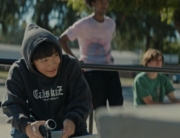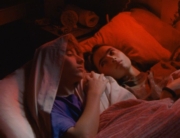All is not well with Kadir (Asante Blackk). We first find him first alone in the bathroom, his vision blurring, as a post-funeral reception takes place elsewhere in the apartment. His brother has just died in an accident, his mother (Cassandra Freeman) is grief stricken and unavailable, and he frequently clashes with his stepfather (Hassan Johnson). Kadir is a talented visual artist who, at the moment, draws his brother’s face over and over again, both in his sketchbook and with a spray can on cement walls. He’s also struggling in high school, and spends most of his time trying to become accepted by a local gang of graffiti artists, run by Skemes (Melvin Gregg).
This gang turns out to be a mixed blessing. On one hand, they give Kadir an outlet for his art by introducing him to graffiti, and they espouse an ethic of celebrating their culture and sticking it to rich folks. On the other hand, they ask Kadir to engage in increasingly dangerous activities to prove his worth. Skemes ends up handing Kadir a gun and requests that he use it to rob someone as a test of loyalty. His idea is for Kadir to target a wealthy White person. The individual Kadir actually has the courage to approach is Luis (Luis Guzmán), an aging transit worker who is all by himself at a subway stop.
Luis is not intimidated. He invites Kadir to have dinner with him, and ends up buying the gun so Kadir has cash to show Skemes. In exchange, Luis offers himself as a resource to Kadir, and invites him to talk any time. Slowly, Kadir begins to get a hold of himself, and their relationship proves transformative, though not without consequence, to them both.
For a mentorship-based coming-of-age film with such clear ancestry (Good Will Hunting, Finding Forrester, Ordinary People, Stand and Deliver), Story Ave is admirably ambitious. It strives to capture the emotional lives of a grieving family and also to paint a more nuanced portrait of how Kadir will understand his place in the world. If he manages to get into art school, will he end up making art for the rich if he becomes successful? And how sustainable is his life in the gang? To what extent is he being used by them? These questions are not answered per se, but director Aristotle Torres has stated his desire to portray graffiti not as an act of vandalism, but as a crucial act of resistance through self-expression.
As the film progresses, Skemes falls too easily into the role of a bad influence and a hypocrite for Torres’s intentions to become fully realized. Add to this that most of the movie is just as trite as it sounds. Barely realized supporting characters espouse too-convenient realizations and opinions, revelations and climaxes come across as pat, and the film neglects to wrestle astutely with its larger questions. The scene in which Kadir and Luis meet, at least, is refreshingly unexpected and well played. Still, by the end, too many banal discoveries and conversations keep this film from becoming thoroughly successful.
If this film finds fans, it will be thanks to some beautiful acting. Blackk is wholly convincing both in his body language and in his delivery as a bereft, frustrated kid, leaving this viewer eager to see him again in the future. Many scenes between Kadir and his friend Moe (Alex R. Hibbert, also a standout) are engaging and believably performed. Also, it should come as no surprise that veteran actor Guzmán excels, embodying his character with modesty, humor, and unforced pathos. He is equally at ease sitting quietly across the counter from Kadir as he is drunkenly losing restraint. He seems not like an actor at all but someone we might encounter on the street.







Leave A Comment